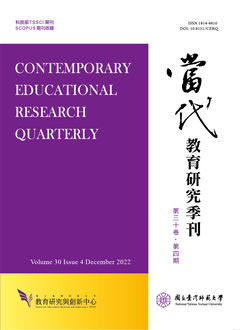

研究目的
師資培育學生成為教師是一連串學習與專業發展的過程,而在此歷程中師資培育學生以成為教師為生涯選擇,培養成為一位具專業素養、態度以及職能的教師,並在此過程學習合作意識與技巧,以及透過自我導向學習朝向永續專業發展。本研究旨在以教學成熟度模式為理論之基礎,制定師資培育學生教學成熟度模式,以分階段提供師資培育學生由具備專業知能及情意基礎、精熟教學領域專門知識、課堂實踐能力、教學評量能力至永續發展一連串專業發展歷程之多面向自我檢核參考。
研究設計/方法/取徑
本研究採取多階段方式進行資料蒐集,首先以專業素養、自我導向學習與合作學習為理論基礎進行文獻探討,並結合教師教學成熟度模式,歸納整合後初擬師資培育生教學成熟度模式5項層級與25項要素之架構,後續採取修正式德爾菲法進行專家意見彙整,最後再依前項結果編製模糊層級分析法調查問卷,以模糊層級分析法進行資料分析,計算各層級要素之權重表現,並建置權重系統。
研究發現或結論
本研究主要結果為五項層級以ML1初始級權重0.38為最高,其餘分別為進階課程管理實施0.19、基本課程管理0.18、量化管理0.13以及永續最適化0.1,而各層級內之要素權重ML1初始級以「教育理論知識」0.28最高,ML2基本課程管理層級以「課程規劃能力」0.33最高,ML3進階課程管理實施層級以「班級經營能力」0.25最高,ML4量化管理層級以「資源管理能力」0.38最高,ML5永續最適化層級以「專業責任」0.33最高。
研究原創性/價值
本研究師資培育生教學成熟度模式係以專業教師理想圖像為師資培育學生專業能力發展之目標,可做為師資培育機構課程規劃及師資培育學生核心能力指標評量之參考,同時兼具教師培育專業永續化發展的模式。
教育政策建議或實務意涵
本研究建構之師資培育生教學成熟度模式將師資培育課程與師資培育學生能力素養串聯整合之架構模式,提供師資培育學生分階段邁向專業化及永續發展之自我評量參考。
Purpose
Teacher education students experience a series of learning and professional development processes before becoming teachers. During the process, teacher education students choose teacher as their career and receive training to become teachers with professional literacy, attitude, and competency. In addition, they acquire cooperative awareness and techniques through the process. Through self-directed learning, the teacher education students sustain their professional development. This study used a capability maturity model as the theoretical basis to construct a capability maturity model for teacher education students, in which the students, through a series of professional development processes, were provided with professional competency and affective education, proficiency in teaching-specific domain knowledge, practical capabilities in classrooms, teaching assessment capabilities, and capabilities for self-assessing multiple aspects of the professional development processes.
Design/methodology/approach
This study collected data through multiple stages. First, literature involving professional literacy, self-directed learning, and cooperative learning as the theoretical bases was discussed. Then, a capability maturity model for teacher education was adopted. After summarization and organization, the model was preliminarily structured with 5 levels and 25 elements. Subsequently, a modified Delphi method was used to summarize expert opinions. According to the obtained results, a fuzzy analytic hierarchy process questionnaire was created to collect and analyze data. The weighting of each level and element was calculated to establish a weighting system.
Findings/results
The primary results revealed that ML1 initial level had the highest weighting of 0.38, followed by the advanced course management implementation level (0.19), basic course management (0.18), quantified management (0.13), and sustainable optimization (0.1). Within each of the levels, the elements with the highest weighting in ML1 (initial level), ML2 (basic course management level), ML3 (advanced course management implementation level), ML4 (quantified management level), and ML5 (sustainable optimization level) were “knowledge regarding education theory (0.28),” “course planning capability (0.33),” “classroom management capability (0.25),” “resource management capability (0.38),” and “professional responsibility (0.33),” respectively.
Originality/value
The proposed capability maturity model for teacher education students used ideal image of professional teachers as the goal for the students’ professional competency development. The model can serve as references for teacher education institutes in course planning and for assessing teacher education students’ core competency indicators. Moreover, the model may be employed to assist sustainable development of teacher education professionalism.
Suggestions/implications
This study constructed a capability maturity model for teacher education students to integrate teacher education courses and relevant competencies and literacy of teacher education students. The model facilitates teacher education students’ professional development in various stages and their self-assessment in sustainable development.

本著作係採用創用 CC 姓名標示-非商業性 3.0 台灣 授權條款授權.
本刊國立台灣師範大學教育研究與創新中心
106台北市和平東路一段162號 | 電話: 02-7749-3670 | E-mail: cerecerq@gmail.com
教創中心 | 師大 | 電子報 | 線上投審系統
本刊由國家科學及技術委員會人文社會科學研究中心補助經費
© 2014 CERI-NTNU
